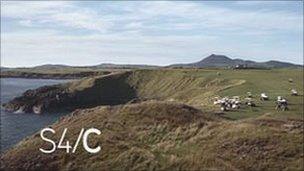Proposed budget cuts of 40% 'threaten S4C's existence'
- Published

The Welsh language broadcaster said it wants a review of its operation led by the S4C Authority
Proposed cuts to S4C's funding could threaten its existence, the station says.
S4C said cuts of 40% to its £100m budget would prevent it fulfilling its legal duty to provide high quality and diverse programming.
The UK government has said it would break the inflation link to S4C funding increases, which insiders say could lead to cuts between 20-30%.
Meanwhile, BBC Wales and S4C said they would look at collaboration.
In its submission to the UK culture secretary Jeremy Hunt, entitled "A Process of Renewal", S4C has said it wishes to carry out a root and branch review of every single aspect of its future, to conclude by June next year.
However, the Welsh language broadcaster said this should be "owned" by the S4C Authority and its staff.
Relations between the S4C Authority and the Department for Culture, Media and Sport (DCMS) have been severely strained in recent weeks.
The authority wants any decision on substantial cuts to be delayed until the outcome of its review.
The DCMS has asked S4C to draw up its response to budget cuts of either 25% or 40%.
Under the scenario of 25% cuts, S4C said it would have to reduce its spending on content from £83m this year to £62m by 2014.
It says such a cut would "strike at the heart of the programme service itself".
Broadcasting hours would need to be cut, including filling afternoon schedules with ultra low cost material or broadcasting the proceedings of the National Assembly for Wales.
The cuts would also call into question its ability to bid for sports rights, and original content for children and young people would be sharply reduced, it is claimed.
'Severely limited'
Under the worst case scenario of 40% cuts, S4C said spending on content would fall to just over £50m by 2014.
This, it said, could lead to up to 800 job losses in the Welsh media sector, as it would have a huge knock-on effect on independent television companies income.
The report said: "Cuts of up to 40% would deliver a totally different type of service.

Menna Richards said both BBC Wales and S4C are facing "unprecedented financial pressures"
"Instead of a comprehensive public service broadcaster, the output would be severely limited in terms of range of programmes, schedule and platforms.
"This would have a disproportionate effect on our current audience, and our ability to attract new audiences. Such a radical reduction would create a high level of risk to the service and call into question the existence of the institution itself.
"We do not believe that a public service broadcaster, established by statute, and so crucial to a vital but vulnerable linguistic culture, should be partially or wholly dismantled without due consideration of all the effects and without time for a full public and parliamentary debate."
In the document, S4C said that whatever cuts are made, it is committed to reducing its staff by 40 over the next two years, which it added would bring the reduction in headcount over the past decade to 40%.
This would save £1.5m in annual salary costs.
Meanwhile, BBC Wales and S4C announced that they are to consider collaborating across a wide range of areas.
Longer-term options, including moving both broadcasters into one media centre, would be considered, the broadcasters said.
BBC Wales director Menna Richards said the areas would include marketing, research, distribution and technology.
Ms Richards said both BBC Wales and S4C are facing "unprecedented financial pressures".
She said in recent weeks the two organisations had been in discussions to explore new ways of working that "might help us jointly to confront the challenges ahead".
Work is already under way on a major joint research project to look at the long-term trends in the usage of Welsh language media.
But Ms Richards said the broadcasters have also been looking at whether there are other ways they can "deepen our partnership for the benefit of audiences, while of course safeguarding the editorial independence of both broadcasters."
The BBC Wales director said she was confident early progress could be made in the fresh collaboration, with the potential to release some additional funding into programme-making over the next 12 to 18 months.
She said they believe co-location could help deliver significant operational savings for both the BBC and S4C as it would allow them to share technology and transmission services.
However, she added that any final decision on co-location would depend on the funding position of both broadcasters.
- Published14 October 2010
- Published10 September 2010
- Published24 August 2010
- Published19 August 2010